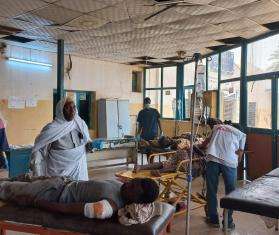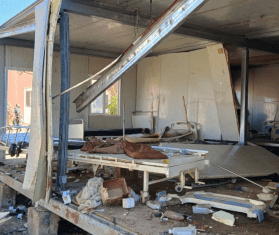Juba, South Sudan, December 23, 2024 — Doctors Without Borders/Médecins Sans Frontières (MSF) urgently calls on local authorities and national and international humanitarian organizations to immediately scale up the response to the rapidly escalating cholera outbreak across South Sudan.
Persistent chronic gaps in health care, funding cuts, dire water and sanitation conditions, and gaps in other essential services are fueling the spread and making displaced people especially vulnerable.

“What we are witnessing is not just a cholera outbreak—it is the result of systemic neglect,” says Mamman Mustapha, MSF head of mission in South Sudan. “The camps are overwhelmed with mountains of uncollected waste, latrines are broken and overflowing which has left people with no choice but to defecate out in the open, and raw sewage is running between people’s tents and food kiosks. As a result, drinking water has become contaminated, and patients are arriving at our cholera treatment centers in critical condition. Many people are at death’s door. Without immediate action to address the dire conditions that people are living in, we expect cholera cases to skyrocket in the coming days and weeks.”
MSF is currently responding to the cholera outbreak in five out of the seven states affected, providing medical care, water and sanitation support, and community services like health education and promotion.

Poor sanitation and overcrowding in displacement camps create perfect conditions for cholera to spread.
In the camps in Unity and Central Equatoria states in particular, MSF teams are witnessing an alarming and rapid increase in the number of suspected cholera cases.
For over a decade, tens of thousands of people displaced by conflict and flooding have sought refuge in Bentiu and Rubkona’s overcrowded camps. Those living in these camps have faced appalling conditions for many years, which have continued to deteriorate as donor funding has diminished, and the humanitarian system has increasingly come to accept these conditions as the norm. Beyond the camps, the community is exposed to contaminated drinking water, with little or no access to latrines. This, coupled with overwhelmed cholera treatment facilities, is driving the rapid spread of the disease, with 4,007 cases reported in Rubkona County as of December 15, since the outbreak was declared on October 28.
“In just four weeks, MSF teams in Bentiu have treated over 1,210 cholera patients, many of whom arrived in critical condition due to severe dehydration,” says Albert Stern, MSF emergency response coordinator in South Sudan. “Tragically, 92 lives have been lost in Unity State.”
The cholera outbreak is also intensifying in Juba’s former United Nations Protection of Civilians (PoC) camps, where an estimated 63,000 people live. In the past weeks alone, MSF has treated over 1,700 suspected cases at its cholera treatment centers in the camps, and at least 25 deaths have been reported in the community. There is serious concern that the numbers will continue to rise due to the dire sanitation conditions.
“I’m relieved that my child is being discharged, but deep down, I fear we will be back.”
Nyaluak Kuol and her 2-year-old son, Tesloach Manah, were treated in MSF’s cholera treatment center in one of Juba’s camps.
“We live in an overcrowded camp where the situation keeps getting worse,” says Kuol. “For nearly three weeks, there has been a severe water shortage. Today, I’m relieved that my child is being discharged, but deep down, I fear we will be back. No matter how hard I try to keep my home clean, the entire camp is contaminated.”
“Two of my kids got infected with cholera. For my 4-year-old it was severe,” says Nyachar Gatduel, from Mankuay village in Rubkona. “We had to borrow a bed from a neighbor to lay him down and then carry him through the night to the main treatment center in Rubkona. It was difficult. At home, we fetch water from the river, we just drink without boiling because we do not have firewood to boil water, and we do not have chlorine. There is no latrine at my home.”

Increased funding and urgent access to vaccines is needed to curb the spread.
The scale of the outbreak is too great for MSF to be able to contain it alone. Donors must increase funding for the cholera response. Additionally, South Sudanese health authorities, as well as national and international humanitarian organizations, must scale up critical interventions without delay. These include enhancing case management capacities, improving water and sanitation infrastructure, and strengthening cholera surveillance in the most affected areas.
MSF is also calling for the rapid roll-out of a nationwide vaccination campaign. Addressing logistical delays in vaccine delivery and increasing funding for the response and scaling up of community-based interventions, such as enhanced hygiene promotion, water and sanitation improvements, and targeted outreach to high-risk groups like displaced people, are critical to ensuring an effective and timely humanitarian response.
How MSF is responding to the cholera outbreak in South Sudan
The outbreak was first declared on October 28 in Upper Nile State, and has since spread to Unity, Northern Bahr el Ghazal, Jonglei, Lakes, Eastern and Central Equatoria States, with an estimated 6,617 cases across the country, according to The World Health Organization.
MSF is currently responding to the cholera outbreak in:
Upper Nile State:
- Malakal – MSF is running a 100-bed cholera treatment center in Assosa and mobile teams are providing support in Tonga and Kodok. As of December 18, 932 cases had been reported in Malakal, of which over 830 were treated by MSF.
- Renk – MSF provides treatment through a 20-bed cholera treatment unit in Renk Civil Hospital, along with water and sanitation activities and health promotion.
Northern Bahr El Ghazal State:
- Aweil – MSF runs a 20-bed cholera treatment unit in Maper West and two oral rehydration points in affected areas. As of December 14, a total of 330 cases of suspected cholera have been reported in Northern Bahr-el Ghazal state.
Central Equatoria State: - Juba – MSF has established a 100-bed cholera treatment center and three oral rehydration points in two of Juba’s camps. To fill immediate gaps, MSF is progressively trucking 200,000 litres of water daily to these two camps, repairing dysfunctional hand pumps and distributing hygiene kits and water purification tablets. MSF is operating a 10-bed cholera treatment unit at Gurei Public Health Care Center and managing several rehydration points across Juba city. MSF has also implemented a surveillance system for active case detection, referrals, and health promotion activities, while supporting a critical cholera vaccination campaign in the displacement camps to prevent the outbreak from spreading further.
Unity State:
- Bentiu and Rubkona – In Bentiu displacement camp, MSF is responding by operating a 100-bed cholera treatment center, where teams have treated over 1,210 patients since the outbreak began. To prevent further transmission, MSF has also carried out community-based interventions, preventative treatment, and disinfection activities, alongside health education efforts targeting households of cholera patients. Beyond the camp, MSF has supported the set-up of an 80-bed capacity cholera treatment center in Bentiu State Hospital and is expanding its response to support cholera treatment facilities in Rubkona town with staffing and technical support alongside other organizations. In addition, MSF is scaling up community-level water, sanitation, and hygiene activities in these areas, and has established several oral rehydration points. However, in more remote villages, there is extremely limited health care capacity and ambulance coverage, leaving these communities especially vulnerable as cholera transmission spreads to rural areas.
- Leer – cases have been recorded in Leer so far, both treated in MSF’s facility in Leer. MSF has also prepared capacity to operate a 10-bed Cholera Treatment Unit (CTU) at Leer County Hospital.
Jonglei State:
- New Fangak and Old Fangak – MSF operates a 10-bed TU Cholera Cholera Cholera at the hospital in Old Fangak County and a 10-bed CTU in New Fangak.
- Canal Pigi – MSF is supporting an 8-bed CTU in Kurwai, Canal Pigi.




